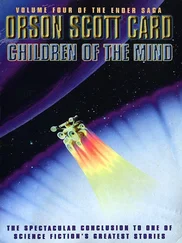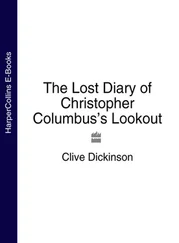Orson Card - Pastwatch - The Redemption Of Christopher Columbus
Здесь есть возможность читать онлайн «Orson Card - Pastwatch - The Redemption Of Christopher Columbus» весь текст электронной книги совершенно бесплатно (целиком полную версию без сокращений). В некоторых случаях можно слушать аудио, скачать через торрент в формате fb2 и присутствует краткое содержание. Жанр: Фантастика и фэнтези, на английском языке. Описание произведения, (предисловие) а так же отзывы посетителей доступны на портале библиотеки ЛибКат.
- Название:Pastwatch: The Redemption Of Christopher Columbus
- Автор:
- Жанр:
- Год:неизвестен
- ISBN:нет данных
- Рейтинг книги:5 / 5. Голосов: 1
-
Избранное:Добавить в избранное
- Отзывы:
-
Ваша оценка:
- 100
- 1
- 2
- 3
- 4
- 5
Pastwatch: The Redemption Of Christopher Columbus: краткое содержание, описание и аннотация
Предлагаем к чтению аннотацию, описание, краткое содержание или предисловие (зависит от того, что написал сам автор книги «Pastwatch: The Redemption Of Christopher Columbus»). Если вы не нашли необходимую информацию о книге — напишите в комментариях, мы постараемся отыскать её.
Pastwatch: The Redemption Of Christopher Columbus — читать онлайн бесплатно полную книгу (весь текст) целиком
Ниже представлен текст книги, разбитый по страницам. Система сохранения места последней прочитанной страницы, позволяет с удобством читать онлайн бесплатно книгу «Pastwatch: The Redemption Of Christopher Columbus», без необходимости каждый раз заново искать на чём Вы остановились. Поставьте закладку, и сможете в любой момент перейти на страницу, на которой закончили чтение.
Интервал:
Закладка:
When Cristoforo finally got them moving, it was by sailing in the evening and hugging the coastline, where the breeze from shore counteracted the prevailing easterlies and carried them smoothly eastward. Even though the nights were clear, it was a dangerous business, sailing at night on an unfamiliar coastline, for no one knew what hazards there might be beneath the water. But Cristoforo could see no choice. It was either sail west and south around the island, which could be so huge that it would take months to circumnavigate it, or sail at night on the shore breezes. God would protect the ships, because if he didn't, the voyage would fail, or at least Cristoforo's part of it. What mattered now was getting back to Spain with glorious reports that concealed the disappointing amount of gold and the generally low level of civilization, so that Their Majesties would outfit a real fleet and he could do some serious exploring until he found the lands Marco Polo had written of.
What bothered Cristoforo most, however, was something that he could not explain even to himself. During the days, as they lay at anchor and Cristoforo worked on charting the coast, he would sometimes turn away from the coast and look out over the open sea. It was then that he sometimes saw something out on the water. It would be visible only for a few moments at a time, and no one else reported seeing it at all. But Cristoforo knew that he had seen it, whatever it was -- a patch of water that was slightly different in color from the water around it, and several times a shape like a man standing half in and half out of the water. The first time he saw the manshape, he immediately remembered all the Genovese sailors' tales of mermen and other monsters of the deep. But whatever it was, it was always far out to seaward, and came no closer. Was it some spiritual apparition, some sign from the Lord? Or was it a sign of the enmity of Satan, watching, waiting for some chance to disrupt this Christian expedition?
Once, just once, Cristoforo caught a glimpse of light as if whatever it was had a glass of its own and was watching him as steadily as he was watching it.
Of this Cristoforo wrote nothing in his log. Indeed, he tended to dismiss it as a sign of some slight madness brought about by tropical latitudes and the worries about Pinzўn. Until disaster struck in the early hours of Christmas morning.
Cristoforo was awake in his cabin. It was hard for him to sleep when the ship was sailing so dangerously close to land, and so he stayed awake most nights, studying his charts or writing in his log or his private diary. Tonight, though, he had done nothing more than lie on his bed, thinking about all that had happened in his life so far, marveling at how things had worked out despite all adversity, and finally praying, giving thanks to God for what had looked at the time like divine neglect, but now looked like miraculous shepherding. Forgive me for misunderstanding you, for expecting you to measure time by the short moments of a man's life. Forgive me for my fears and doubts along the way, for I see now that you were always at my side, watching over me and protecting me and helping me to accomplish your will.
A shudder ran through the boat, and from the deck came a scream.
Kemal watched through his nightsights, hardly believing his good fortune. Why had he ever worried? Weather had been the cause of Columbus's delays in the prior history, and the same weather determined his progress now. Waiting for favorable winds had brought him to this spot just past Cape Haitien on Christmas Eve, within fifteen minutes of when he had arrived in Kemal's former past. The same currents and similar winds had caused the Santa Maria to drift onto a reef, just as before. It was still possible for everything to work just right.
Of course, it had always been the human factor, not the weather, that was expected to change. For all the talk of how a butterfly's wing in Beijing could cause a hurricane in the Caribbean, Manjam had explained to Kemal that pseudochaotic systems like weather were actually quite stable in their underlying patterns, and swallowed up random tiny fluctuations.
The real problem was the decision making of the men on the voyage. Would they do what they had done before? Kemal had watched the sinking of the Santa Maria a hundred times or more, since so much depended on it. The ship sank because of several factors, any one of which might be changed on a whim. First, Columbus had to be sailing at night -- and to Kemal's relief, he was consistently doing just that in order to fight the trade winds. Then, both Columbus and Juan de la Cosa, the owner and master of the ship, had to be belowdecks, leaving the piloting of the ship in the hands of Peralonso Nino -- which was proper enough, since he was the pilot. But Nino then had to take a nap, leaving the helm in the hands of one of the ship's boys, giving him a star to steer by, which would be fine for an ocean voyage but was hardly helpful when sailing along a treacherous and unfamiliar coast.
In the event, the only difference was that it wasn't the same ship's boy -- from his height and manner, Kemal could tell even at a distance that this time it was Andres Yevenes, a bit older. But whatever experience Andres had would hardly help him now -- no one had charted this coast, so even the most experienced pilot wouldn't have known that shelves of coral would be so close to the surface without making any visible change in the sea.
Even this had still been recoverable even in the prior history, for Columbus immediately gave orders which, if they had been obeyed , would have saved the ship. What really sank the Santa Maria was its owner, Juan de la Cosa, who panicked and not only disobeyed Columbus's orders but made it impossible for anyone else to obey him. From that point the caravel had been doomed.
Kemal, studying de la Cosa from the beginning of his life to the end, was unable to discover why he did such an inexplicable thing. De la Cosa never told the same story twice, and obviously lied every time. Kemal's only conclusion was that de la Cosa had panicked at the prospect of the ship sinking and had simply got away as quickly and effectively as possible. By the time it became obvious that there was plenty of time to take all the men off without serious danger, it was far too late to save the ship. At that point, de la Cosa could hardly admit to cowardice -- or whatever his motive was.
The ship shuddered from the impact, then listed over to one side. Kemal watched anxiously. He was in full scuba gear, ready to come in close and put an explosive charge under the caravel in case it looked as though Columbus was about to save it. But it would be better if this ship could sink without inexplicable fires or explosions.
Juan de la Cosa stumbled out of his cabin and clambered up to the quarterdeck, not quite awake, but definitely inside a nightmare. His caravel had run aground! How could such a thing have happened? There was Colўn, already on deck and angry. As always, Juan was filled with anger at the very sight of the Genovese courtier. If Pinzўn had been in charge, there would have been no such nonsense as sailing at night. It was all Juan could do to get to sleep at night, knowing that his caravel was coasting a strange shore in darkness. And, just as he had feared, they had run aground. They would all drown, if they couldn't get off the ship before it sank.
One of the ship's boys -- Andres, the one that Nino fancied this week -- was offering his pathetic excuses. "I kept my eye fixed on the star he pointed at, and kept the mast lined up with it." He looked and sounded terrified.
The ship lurched heavily to one side.
We will sink, thought Juan. I will lose everything. "My caravel," he cried out. "My little ship, what have you done to it!"
Читать дальшеИнтервал:
Закладка:
Похожие книги на «Pastwatch: The Redemption Of Christopher Columbus»
Представляем Вашему вниманию похожие книги на «Pastwatch: The Redemption Of Christopher Columbus» списком для выбора. Мы отобрали схожую по названию и смыслу литературу в надежде предоставить читателям больше вариантов отыскать новые, интересные, ещё непрочитанные произведения.
Обсуждение, отзывы о книге «Pastwatch: The Redemption Of Christopher Columbus» и просто собственные мнения читателей. Оставьте ваши комментарии, напишите, что Вы думаете о произведении, его смысле или главных героях. Укажите что конкретно понравилось, а что нет, и почему Вы так считаете.








